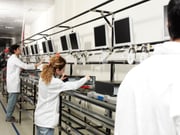Shift Work Might Raise Your Odds for Severe COVID-19
By Cara Murez HealthDay Reporter
FRIDAY, Dec. 16, 2022 (HealthDay News) -- While shift workers aren't more likely to get infected with COVID-19, they are more likely to suffer from severe disease requiring hospitalization, researchers warn.
Norwegian scientists studied the risks of both shift workers and people who worked in face-to-face jobs in terms of COVID-19 infection and severity. They did this through online surveys of more than 7,100 people from 16 countries.
The researchers found that those in face-to-face jobs were more likely to be infected.
"However, they did not have a higher risk of getting a more severe outcome of the infection, compared to those not working face-to-face with others," said study first author Bjørn Bjorvatn, a professor of medicine at the Department of Global Public Health and Primary Care at the University of Bergen in Norway.
Shift workers did not have a higher risk of getting infected, which Bjorvatn said is likely because of the contagiousness of the virus and the high infection rate throughout society.
However, they had a risk of being hospitalized with the virus that was almost sixfold higher than daytime workers.
This supports the idea that sleep deprivation negatively affects the immune system, according to the study.
"Other studies show that the response to vaccination is poorer in sleep-deprived individuals. Therefore, shift workers should take their vaccines after a good night sleep," Bjorvatn advised in a university news release.
The findings were published recently in the journal Chronobiology International.
More information
The U.S. Centers for Disease Control and Prevention has more on COVID-19.
SOURCE: University of Bergen, news release, Dec. 13, 2022

The news stories provided in Health News and our Health-E News Newsletter are a service of the nationally syndicated HealthDay® news and information company. Stories refer to national trends and breaking health news, and are not necessarily indicative of or always supported by our facility and providers. This information is provided for informational and educational purposes only, and is not intended to be a substitute for medical advice, diagnosis, or treatment.

